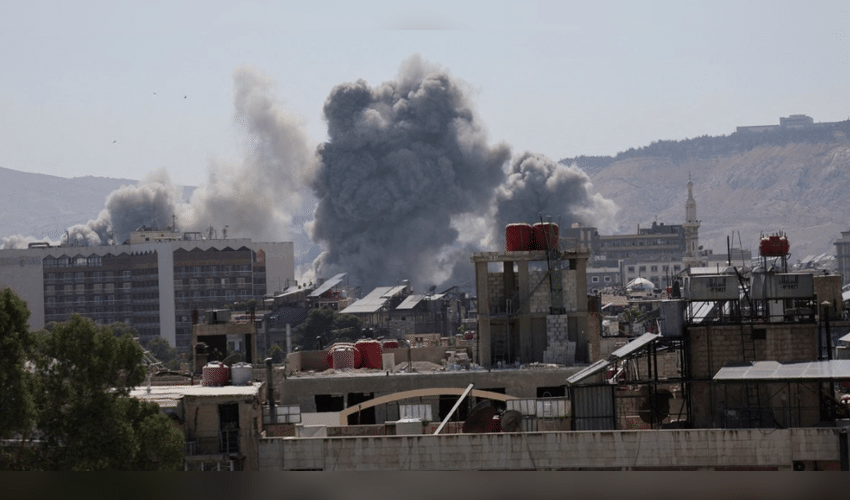World
Israel carries out intense airstrikes in Damascus, pledging to defend the Druze community.

On Wednesday, July 16, Israel launched a series of powerful airstrikes in Damascus, targeting the Syrian defense ministry and an area close to the presidential palace. The strikes were part of a broader Israeli response to what it described as aggressive actions by Syrian government forces against the Druze community in southern Syria. Israel demanded that these forces withdraw immediately and vowed to protect the Druze minority from further attacks.
This move marked a significant escalation in Israel's stance against the interim Syrian administration led by President Ahmed al-Sharaa, despite the Syrian government’s growing relationship with the United States and early-stage security communications with Israel. Israeli officials have expressed deep mistrust of Syria’s new leadership, labeling them as near-jihadist and warning they will not tolerate Syrian military presence near their border. The Druze community’s safety has become a particular focus, especially amid strong calls for intervention from Israel’s own Druze citizens.
The United States intervened diplomatically, with Secretary of State Marco Rubio announcing that discussions with all involved parties had led to agreements aimed at halting the violence by the end of the day. Meanwhile, the United Nations Security Council prepared to convene the following day to address the situation. Israel’s ambassador to the UN, Danny Danon, urged the international body to denounce the violence against Syrian civilians and reiterated Israel’s readiness to act firmly against threats along its borders.
The escalation follows intense clashes in and around the largely Druze city of Sweida. Government forces, Druze militias, and Bedouin tribal fighters have all been engaged in violent confrontations. On Wednesday afternoon, warplanes could be heard over Damascus, followed by heavy explosions and rising smoke. A portion of the defense ministry was reduced to rubble, and a Syrian medical source confirmed that at least five security personnel had been killed. An Israeli military official stated that the strikes hit the main entrance to Syria’s military headquarters and a nearby military site close to the presidential palace. He accused Syrian forces of either ignoring or actively contributing to the violence against the Druze community. Israeli military chief Eyal Zamir emphasized that Israel would not allow southern Syria to become a haven for terrorism.
President Sharaa is facing growing challenges in trying to reunify the country, as many minority groups remain suspicious of his Islamist-led government. Tensions were further heightened in March after mass killings targeted Syria’s Alawite population. Earlier this week, government troops were deployed to Sweida to quell ongoing fighting but quickly became embroiled in direct conflict with Druze militias. Although a ceasefire was announced by Syria’s interior ministry and Druze leader Sheikh Yousef Jarbou, new fighting broke out in the city, according to on-the-ground witnesses.
Residents of Sweida reported being trapped in their homes amid gunfire and explosions. One local man, speaking anonymously, described trying to keep his children quiet out of fear that fighters would hear them. The Syrian health ministry confirmed that dozens of bodies—both civilian and combatant—had been discovered at a local hospital. Estimates of the death toll vary: the Syrian Network for Human Rights reported 169 deaths, while some security sources claimed the number was closer to 300. Reuters was unable to independently verify these figures.
The Druze, a religious group derived from Islam, are spread across Syria, Lebanon, and Israel. Following rising concern within Israel, a group of Israeli Druze crossed the border on Wednesday to support their relatives in Syria. Israeli Prime Minister Benjamin Netanyahu confirmed that the military was actively working to assist Druze communities but warned against unauthorized border crossings. The military said it was trying to bring back the civilians who had entered Syrian territory.
One Israeli Druze, Faez Shkeir, expressed his anguish over the violence, explaining that many of his family members remained in Sweida and were suffering. He described scenes of looting, burning homes, and the forced displacement of loved ones, lamenting that he felt powerless to intervene. A Reuters correspondent reported witnessing government forces ransacking homes, stealing valuables, and even executing civilians. One man showed the journalist his brother’s lifeless body, shot inside their house. In response, the Syrian government released a statement condemning the chaos and vowing to bring the perpetrators to justice. It also reaffirmed its commitment to safeguarding the rights of people in Sweida. President Sharaa has made repeated promises to protect minority communities throughout Syria.



